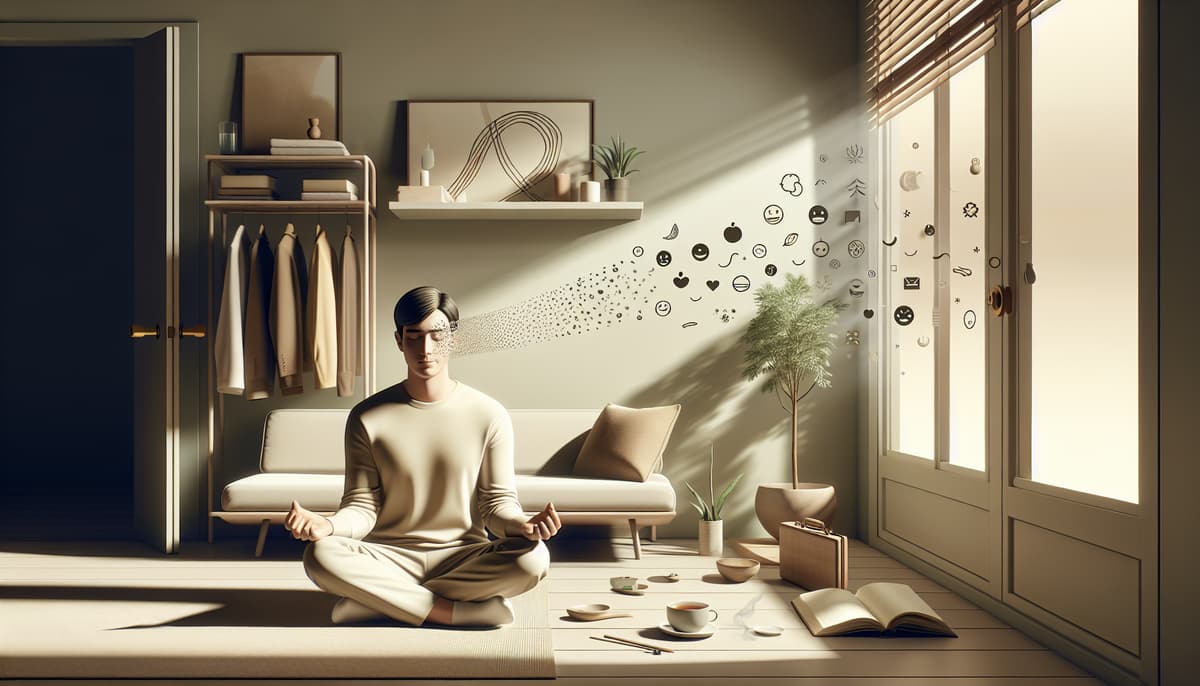Imagine your mind as a cluttered room. Piles of old memories in the corner, stress from last week’s meeting lying on the floor like a dropped coat, and emotions from that argument two years ago still hanging in the air like forgotten laundry. You walk through it every day, dodging the mess, pretending it’s fine—until it’s not.
That’s where I was. Functioning on the outside, but inside? Emotionally overfurnished. I wasn’t numb, I was exhausted. And I thought emotional minimalism meant I had to shut down, suppress, become some cold-hearted monk with zero feelings and a side of nihilism.
Turns out, I had it all wrong.
Emotional decluttering isn’t about throwing your feelings in the bin and calling it Zen. It’s about deciding—carefully, intentionally—what deserves your emotional energy. It’s the art of emotional investment in slow motion. Just like you wouldn’t blow your life savings on impulse buys, emotional minimalism teaches you not to pour your soul into every passing chaos.
Emotional Decluttering Is Not Detachment—It’s Discernment
We live in a world that rewards emotional overdrive. Outrage, urgency, overstimulation—it’s everywhere. Social media wants you reactive. Work wants you emotionally available 24/7. Friends, family, the news—it all adds up.
So when you start emotional decluttering, people might say you’re becoming distant. They don’t realize what you’re doing is reclaiming space. You’re not shutting down. You’re filtering. You’re asking:
- Does this feeling align with who I want to be?
- Is this mine to carry, or someone else’s projection?
- Will this matter in a month, a year?
Emotional minimalism is like a mental budget. You only spend where it counts. And that’s not cold—it’s wise.
The Energy Economy: Your Emotions as Currency
Let’s make this tangible. Think of your emotional bandwidth like a bank account. Every worry, every argument, every overthinking spiral? That’s a withdrawal.
Now imagine if you only made investments. You put energy into what brings growth: meaningful conversations, inner peace, creative expression, healthy boundaries. Suddenly, you’re not broke emotionally. You’re building compound interest in clarity.
This slow, steady approach is the heartbeat of emotional decluttering. It’s not about becoming void of feeling, but about choosing high-yield emotional assets. You’re not avoiding emotions—you’re investing in the ones that pay you back.
Zero Drama Doesn’t Mean Zero Depth
There’s this idea that living a “Zero Drama” life means you’re boring or emotionally shallow. But let me tell you—it’s quite the opposite. Since I started emotionally decluttering, I feel more. Not less.
Why? Because I’m not drowning. I’ve built space for the big stuff—the sacred, the soul-filling kind of emotion. Joy lands deeper now. Grief moves through me rather than parking in my chest. I can love without losing myself. I can listen without absorbing.
Truth is, when you stop giving energy to chaos, you start having energy for connection. Real, rooted, radiant connection. And that’s what we’re all craving, isn’t it?
Practical Ways to Start Emotional Decluttering
If you’re thinking, “This sounds lush, but where do I begin?” I’ve got you. Emotional decluttering doesn’t need to be some grand life overhaul. Start with small, intentional shifts:
- Audit your emotional triggers. For one week, jot down what drains you. Is it scrolling the news? Certain conversations? Deadlines at 3 AM?
- Pause before reacting. Create a 10-second buffer. Breathe. Ask: “Is this worth my emotional energy?”
- Set emotional boundaries. This could be as simple as, “I’m not available to talk about that right now” or “I’ll get back to you when I’ve had time to think.”
- Curate your inputs. Be intentional about what you consume. Follow people who uplift you. Read things that expand you. Mute what muddles you.
- Schedule space to feel. Emotional decluttering doesn’t mean bottling things up. It means giving yourself *designated* space to process. Whether that’s journaling, a walk in silence, or a good cry in the bath—make it sacred.
And if you need a place to start your journey into a drama-free existence, take a peek at Living the Zero Life. It’s packed with resources and perspective shifts that help you live lighter—emotionally and otherwise.
What Happens When You Emotionally Declutter
Here’s what started changing for me when I began emotional decluttering:
- More clarity. I stopped second-guessing everything and started trusting my gut.
- More peace. Not because life stopped being chaotic, but because I stopped investing in the chaos.
- More confidence. I finally had the energy to show up fully in the places that mattered.
- More creativity. When your mind isn’t cluttered with noise, inspiration flows in like a breeze through open windows.
It’s not about becoming invincible. It’s about becoming intentional. And it’s bloody liberating.
Letting Go Is a Skill, Not a Personality Trait
I used to think emotional minimalism was for a certain “type” of person. You know, the unbothered ones. The stoic sages sipping herbal tea at 6 am while writing in their gratitude journals with a fountain pen.
That wasn’t me.
I’m sensitive. I cry at dog commercials. I care deeply, sometimes too deeply. And yet, I’ve learned to let go. Not because I stopped feeling, but because I started choosing.
And that’s the secret. Emotional decluttering isn’t about changing who you are. It’s about honouring your depth without drowning in it. It’s about offering your emotions somewhere to land, not letting them run the show.
Think of it like emotional feng shui. You’re rearranging the furniture in your inner world so that energy can flow smoothly. You’re making space for what matters. You’re finally able to breathe.
Your Emotional Space Is Sacred—Protect It
You wouldn’t leave your front door open to every stranger passing by. So why leave your emotional door wide open to every passing drama?
Your emotional space is sacred. It’s where your intuition lives. It’s where your creativity is born. It’s where your peace grows roots.
Protect it. Curate it. Declutter it. Not because you’re afraid of feeling—but because you’re ready to feel better. To feel wiser. To feel aligned.
And remember, emotional minimalism doesn’t mean you stop caring. It means you stop leaking. You stop hemorrhaging energy into places that don’t deserve you.
Because true peace doesn’t come from emotional emptiness, but from choosing carefully where your emotional currency flows.




